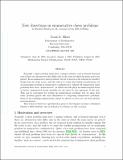| dc.contributor.author | Elkies, Noam | |
| dc.date.accessioned | 2009-04-21T03:40:03Z | |
| dc.date.issued | 2005 | |
| dc.identifier.citation | Elkies, Noam D. 2005. New directions in enumerative chess problems. Electronic Journal of Combinatorics 11, (2). | en |
| dc.identifier.issn | 1077-8926 | en |
| dc.identifier.uri | http://nrs.harvard.edu/urn-3:HUL.InstRepos:2797454 | |
| dc.description.abstract | Normally a chess problem must have a unique solution, and is deemed unsound even if there are alternatives that differ only in the order in which the same moves are played. In an enumerative chess problem, the set of moves in the solution is (usually) unique but the order is not, and the task is to count the feasible permutations via an isomorphic problem in enumerative combinatorics. Almost all enumerative chess problems have been ``series-movers'', in which one side plays an uninterrupted series of moves, unanswered except possibly for one move by the opponent at the end. This can be convenient for setting up enumeration problems, but we show that other problem genres also lend themselves to composing enumerative problems. Some of the resulting enumerations cannot be shown (or have not yet been shown) in series-movers. | en |
| dc.description.sponsorship | Mathematics | en |
| dc.language.iso | en_US | en |
| dc.relation.hasversion | http://arxiv.org/abs/math/0508645 | en |
| dash.license | LAA | |
| dc.subject | combinatorics | en |
| dc.subject | chess | en |
| dc.title | New directions in enumerative chess problems | en |
| dc.relation.journal | Electronic Journal of Combinatorics | en |
| dash.depositing.author | Elkies, Noam | |
| dash.contributor.affiliated | Elkies, Noam | |


